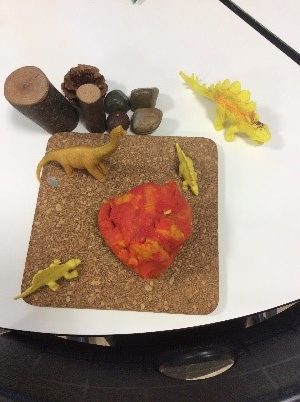
Exploration and Investigation – Play Dough in the ELC
Prompting Play, Learning, Language, Creation, Experimentation and Investigation Skills
Children enjoy every aspect of the exploration of play dough. Using this amazing material is a never-ending tactile learning experience for all children. When given play dough, children are instinctively motivated to explore its soft and responsive sensory qualities. They squeeze it, poke it, squash it, pick it up and pat it down. The dough responds to each of their actions and the child is learning that their actions have consequences. Working play dough with their hands develops the child’s large and small muscles and aids eye-hand coordination. It helps to improve fine motor skills, which is beneficial to daily activities. We often find that children start their day at the play dough table. This is because using play dough is a calming activity. Children work their stress out through their hands, so play dough is not only loads of fun, but also can be a useful way to help children release stress.
As Educators, we often sit with the children at the play dough table. We encourage the children to share what they are making, their thoughts, feelings, and processes they are using when working with the play dough. “What have you made out of play dough? How did you do it? What could you add? Through the asking of questions, we can draw on the child’s thinking processes and their imagination.
Other benefits of play dough is that it encourages mathematical and scientific exploration. The language we use such as which ball is bigger, how long do you need your roll, how many eggs for the nest, or how long will the cupcakes need to cook, is building the scaffolding for further mathematical concepts to be explored. Scientific skills are developed by understanding in manipulating different resources you can create different objects.
Play Dough is Fun:
- It helps to strengthen small fingers, hands and wrists. Children gain control over their hand and arm movements, which improves coordination.
- It helps to build your child’s imagination.
- It helps children develop self esteem – there is no right or wrong way to use play dough.
- Play dough fosters cooperative play. Playing with dough with others helps children understand the importance of sharing.
- Discussing what has been created helps build communication skills and develops imagination.
- It can be used to help children learn about numbers and counting.
Play dough is a lovely open-ended toy – it can be anything – food, animals, faces, shapes. The possibilities are endless!
by Kristin De Vos, ELC Coordinator









